Access your environmental data wherever you need it
Todd Pierce explains in this short video how Locus Technologies data portability can be available for all your data needs.
Todd Pierce explains in this short video how Locus Technologies data portability can be available for all your data needs.
Director of Sales Engineering, Steve Paff, highlights Locus Software’s configurable hierarchy and how versatile it can be.
Locus Technologies, Nancy-Jeanne LeFevre walks through the process of identifying a project pathway boundary in this short video.
Chris De Cree, an EHS Implementation Manager from Locus Technologies walks us through our container tracking tool.
Chris De Cree, an EHS Implementation Manager from Locus Technologies walks us through our container tracking tool.
Locus Technologies’ customizable software makes scheduling and collecting routine water samples is made easy by using Locus Mobile and EIM.
There is a need for most water entities to centralize data, and more easily load, share, analyze, and report data. Locus Technologies’ customizable software makes scheduling and collecting routine water samples is made easy by using Locus Mobile and EIM. Below is a list of frequent challenges that customers have encountered during their water sampling process and how they can be solved using the right tools from Locus. or better communications.
Planning tools need to allow flexibility in terms of different sampling intervals and date ranges, different field and analytical parameters, and account for location grouping. Using a well-designed application can pull together all of this detailed information and can provide a summary view of the individual samples. A manager can easily view sample status, and whether the sample is complete, in process, or planned. A well-designed application can also generate the chain of custody (COC), and lab and sample shipping date information and labels per sample, which is a huge time saver. This type of sample tracking detail seemed to be very useful to many conference attendees to help ensure they are in regulatory compliance with required sampling frequencies. A key feature to look for is an application that is flexible enough that it can allow one-time, unplanned sample events such as water main breaks, customer complaints and schedule changes, and can handle complex multi-year routine sampling with ease. As a plus, it’s easy for you or your manager to know where you stand at any time.
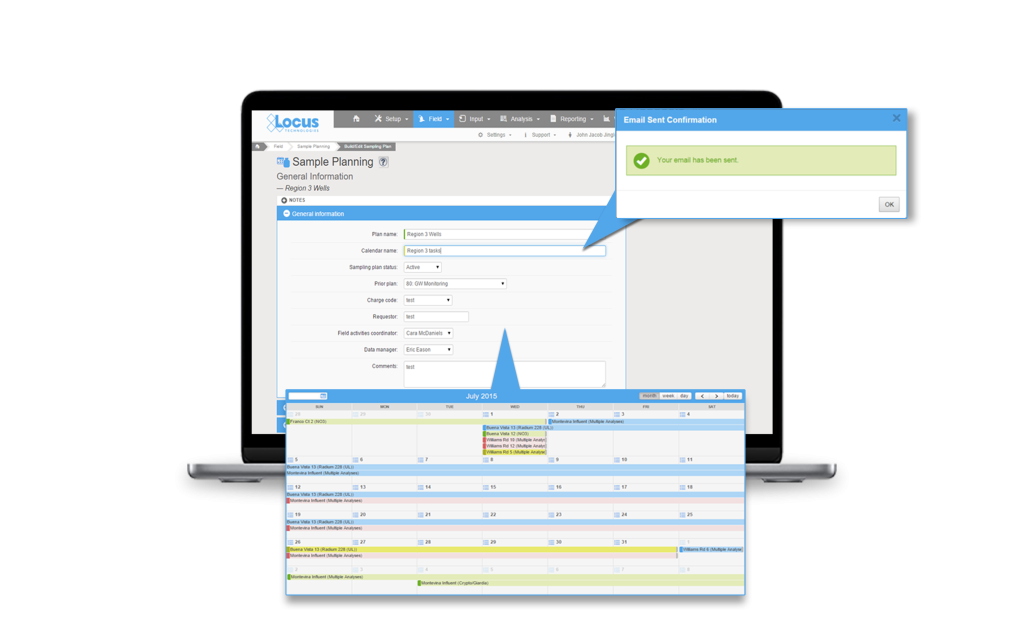
Data entry errors and fixing bad data when it was transcribed from field notes to Excel or other programs is a persistent problem with the old way of doing things. Your company needs a better way to streamline the error prone data collection process. Many clients are interested in an alternative to the pencil/paper/clipboard method and had goals to move to tablet or smartphone for data collection. The universal wish list for mobile field applications included:
Everyone is aware that software updates all the time. Sometimes its security enhancements and sometime feature enhancements or bug fixes. A source of frustration is getting a software update and not knowing what was updated or how best to incorporate a new feature/enhancement into their established process. There was also concern for impact to an established routine with field crews that were used to the existing way of doing things. Even if a functionality improved the workflow, enhancements are only valuable to a user if they understand how to use them and how to incorporate them into their existing process.
Mobile applications, which appear very simple to the users, are in reality complex software and require careful integration with the receiving database for a range of complex use cases. This makes rolling out new mobile features challenging for both the developers and the users. Enhanced customer/developer communication along with a sandbox environment can go a long way towards solving some of the inherent issues with rapid innovations and updates associated with cloud and mobile software.
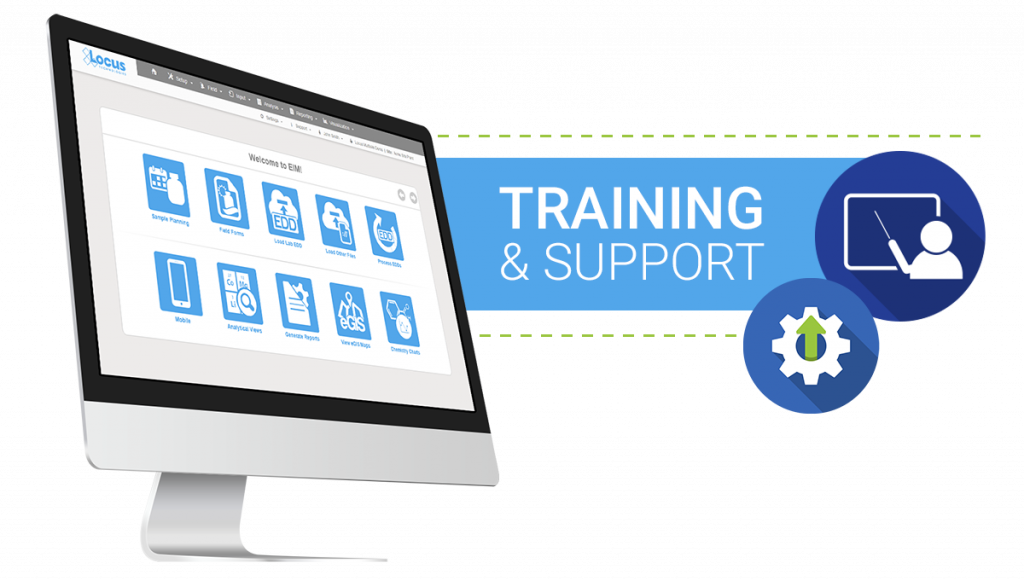
Software tools are available and can solve a lot of the common data management challenges, but know what you want, know the problem you are trying to solve and know it will take some time and effort, but the end result will significantly improve your business processes. Though these challenges are present when choosing a software, Locus Technologies has the experts to help you hurdle the challenges to find the solution that is best for your business.
Tracking your data is made easy within our software as a service (SaaS), Locus Platform (LP). Your company can take advantage of LP’s mobile-aware browser functions, giving you the capability to do all your fieldwork with your existing phones or tablets. When cellular connections are unavailable or unreliable, Locus also has a Mobile app which supports the offline capabilities you need to keep your workflow going.
Regardless of your mobile approach, each mobile form can be easily configured to capture the data you require in the field such as photos and the sampling results.
Whether in the office, or out in the field, Locus Technologies is with you every step of the way during the tracking process. Contact us to find your solution.
![]()
Many in our material-driven culture, particularly in Silicon Valley, assign more excellent value to companies based on how much venture capital or private equity money they have raised or how quickly their companies have grown after initial seeding, and less to founders who bootstrapped their companies from nothing and after that, positioned them for long and steady growth. Although the term means different things in different areas of knowledge, in entrepreneurship, bootstrapping is the process of starting a business with little or no external funding.
Locus has proven that how much funding a startup company has raised or how quickly it has grown are the wrong metrics to measure a company’s success, particularly in the arena of environmental compliance and data management. We bootstrapped Locus in 1997 and, without outside capital, created a new industry at the intersection of two significant trends before either was a trend: the growth in Internet usage and the growth in the acquisition, storage, and analysis of environmental information. Locus not only defined and pioneered this new space of environmental information management in the cloud but also became an industry leader leaving behind many well-funded startups with “borrowed ideas” and established ERP software companies. At every startup stage, some actions are “right” for the startup to maximize return on time, money, and effort. Fortunately, Locus took the necessary steps that allowed it to weather several recessions and market downfalls.
While bootstrapping techniques are not just limited to funding, they also apply to how companies are run. By bootstrapping Locus, we created a built-to-last, slow-burn startup that was focused on the singular goal of building a cloud-based environmental data information management system and avoided expending effort on expanding applications that the market did not need or those that we were too dependent on external help. Bootstrapping provided Locus with a strategic roadmap for achieving sustainability through customer funding (i.e., partnering with customers)—if it is essential for Locus, it must be necessary for the customer first. If it is vital for customers, they must pay for a portion of it and have “skin in the game. “We don’t build applications to attract customers. We attract customers with our ideas to build applications together” became Locus’s modus operandi: Locus was born and built with this simple philosophy.
Once Locus had built a solid customer base, Locus encouraged its paying customers to become consultants who defined the Locus product map. This strategy resulted in a rapid evolutionary expansion of Locus’ software in the marketplace. Crowdsourcing product development from customers with real-world problems has become the cornerstone of Locus’ success in the market.
Let us digress here to comment on what it takes to build an environmental database management system. In the 1990s, when Dr. Duplan was leading the development of a client-server database for his then-employer (there were no internet-based databases back then), he and others now at Locus attended a trade show where a product called Oracle Environmental or something like that was being marketed. Yes, this is the same Oracle that is now one of the largest software companies in the world, with a market cap in the hundreds of billions, revenues in the tens of billions, profits in the billions, and over 130,000 employees.
This small group of engineers and scientists wondered how they could compete against a growing behemoth like Oracle with all its programmers and financial resources. They listened to a marketing spiel and took the system for a test drive at Oracle’s booth. Their worries almost immediately vanished. What they saw was characterized by all as a system that was “a mile wide and an inch deep.” It was designed and developed by individuals with no field experience, little or no engineering or scientific expertise, and little understanding of environmental data and data flow. It claimed to touch on many different types of data (which it did) but owing to its lack of depth, it clearly could not work in the real world. Sure enough, the product was gone within a few years.
In contrast, EIM has been designed and developed by individuals with advanced degrees in civil and environmental engineering, water resources, geology, chemistry, and biology. All who are not solely computer programmers have spent serious time in the field, have overseen the drilling of boreholes and wells, planned and collected samples, verified and validated analytical data, and have created data reports for internal, external entities. These individuals are very cognizant of the vagaries of environmental data.
All these questions make sense to us, and we have an answer to them. Our deep domain expertise in such matters, coupled with our backgrounds in engineering and the sciences and our relevant work experience, has enabled us to work with our customers to build ground-breaking tools and modules for our products that work for all companies.
While other environmental software companies have come and gone—often after getting much press, only to fizzle out on broken promises and dried-up funding, Locus has never wavered from its path to provide environmental data management services to corporations and government agencies. Despite the absence of a flashy PR machine and VC or PE funding, Locus has continued to be a profitable, independent, and visionary organization, which is now considered one of the top environmental software companies in the world.
This is the fourth post highlighting the evolution of Locus Technologies over the past 25 years. The first three can be found here and here, and here. This series continues with Locus at 25 Years: Blockchain for Emissions Management.
Locus Platform is the preeminent on-demand application development platform for EHS, ESG, and beyond, supporting many organizations and government institutions. Individual enterprises and governmental organizations trust Locus’s SaaS Platform to deliver robust, reliable, Internet-scale applications. The foundation of Locus Platform (LP) is a metadata-driven software architecture that enables multitenant applications. This unique technology, a significant differentiator between Locus and its competitors, makes the Locus Platform fast, scalable, and secure for any application. What do we mean by metadata-driven? If you look up metadata-driven development on the web, you find the following:
“The metadata-driven model for building applications allows an Enterprise to deploy multiple applications on the same hosting infrastructure easily. Since multiple applications share the same Designer and Rendering Engine, the only difference is the metadata created uniquely for each application.”
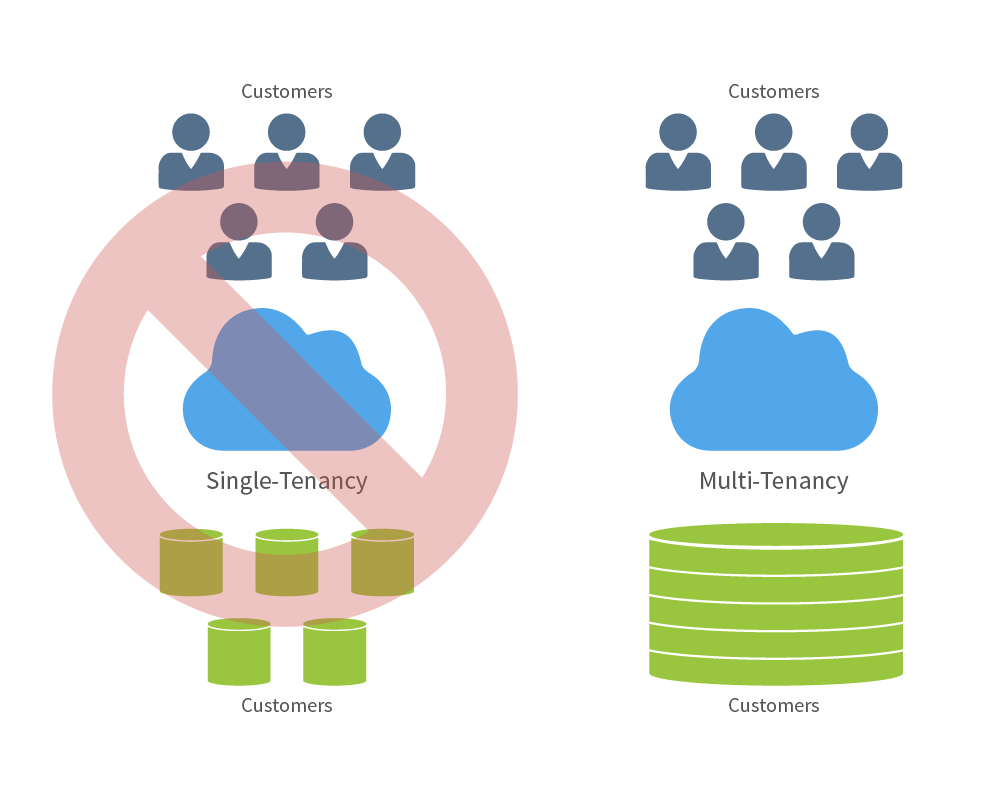
The Triumph of the Multitenant SaaS model, which Locus brings to the EHS/ESG industry.
In the case of LP, it is the Designer and Rendering Engine cited in this definition. All LP customers share this engine and use it to create their custom applications. These applications may consist of dashboards, forms to enter data, plots, reports, and so forth, all designed to meet a set of requirements. Instructions (metadata) stored in a database tell the engine how to build these entities, the total of which form a client-designed application.
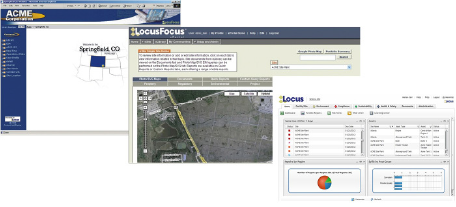
Locus Platform’s evolution to the leading EHS and ESG Platform.
History has shown that every so often, incremental advances in technology and changes in business models create significant paradigm shifts in the way software applications are designed, built, and delivered to end-users. The invention of personal computers (PCs), computer networking, and graphical user interfaces (UIs) gave rise to the adoption of client/server applications over expensive, inflexible, character-mode mainframe applications. And today, reliable broadband Internet access, service-oriented architectures (SOAs), and the cost inefficiencies of managing dedicated on-premises applications are driving a transition toward the delivery of decomposable, collected, shared, Web-based services called software as a service (SaaS).
With every paradigm shift comes a new set of technical challenges, and SaaS is no different. Existing application frameworks are not designed to address the unique needs of SaaS. This void has given rise to another new paradigm shift, namely platform as a service (PaaS). Hosted application platforms are managed environments specifically designed to meet the unique challenges of building SaaS applications and deliver them more cost-efficiently.
The focus of Locus Platform is multitenancy, a fundamental design approach that dramatically improves the manageability of EHS and ESG SaaS applications. Locus Platform is the world’s first PaaS built from scratch to take advantage of the latest software developments for building EHS, ESG, sustainability, and other applications. Locus Platform delivers turnkey multitenancy for Internet-scale applications.
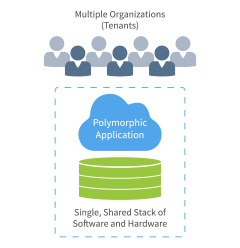
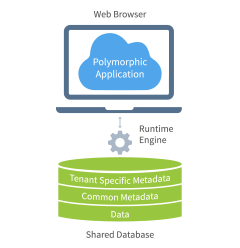
A single shared software and hardware stack across all customers.
The same applies to many different sets of users; all Locus’ LP applications are multitenant rather than single-tenant. Whereas a traditional single-tenant application requires a dedicated group of resources to fulfill the needs of just one organization, a multitenant application can satisfy the needs of multiple tenants (companies or departments within a company, etc.) using the hardware resources and staff needed to manage just a single software instance. A multitenant application cost-efficiently shares a single stack of resources to satisfy the needs of multiple organizations.
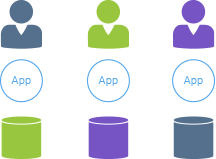
Single-tenant apps are expensive for the vendor and the customer.
Tenants using a multitenant service operate in virtual isolation: Organizations can use and customize an application as though they each have a separate instance. Yet, their data and customizations remain secure and insulated from the activity of all other tenants. The single application instance effectively morphs at runtime for any particular tenant at any given time.
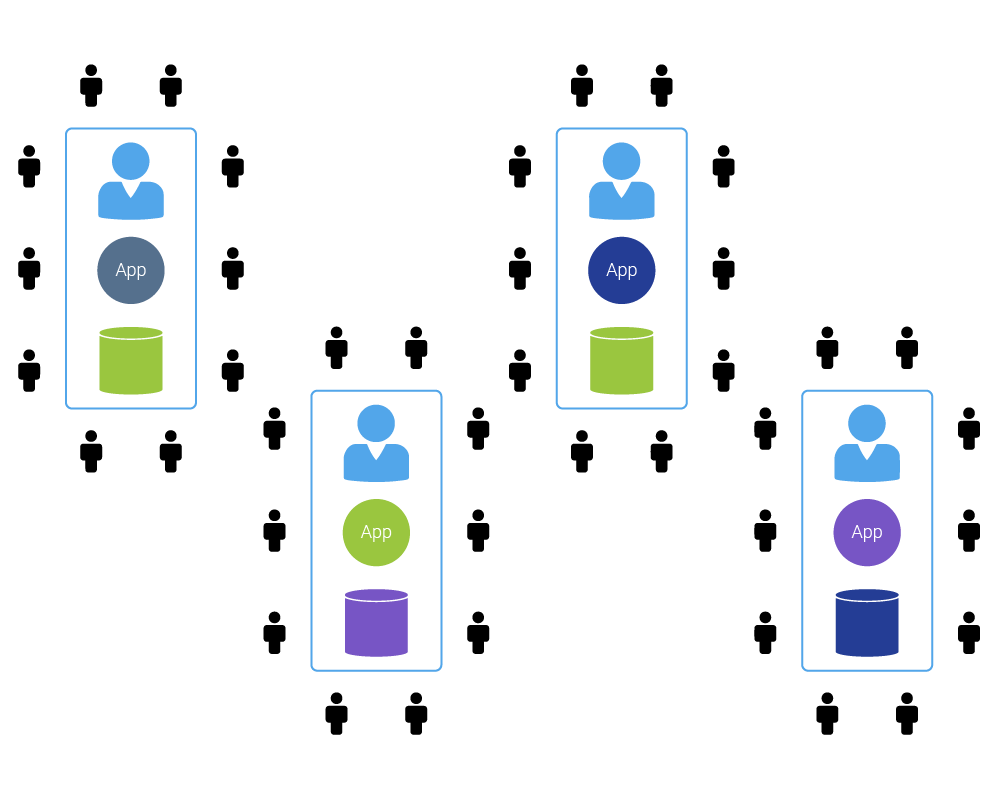
Single-tenant apps create waste
Multitenancy is an architectural approach that pays dividends to application providers (Locus) and users (Locus customers). Operating just one application instance for multiple organizations yields tremendous economy of scale for the provider. Only one set of hardware resources is necessary to meet the needs of all users, a relatively small, experienced administrative staff can efficiently manage only one stack of software and hardware, and developers can build and support a single code base on just one platform (operating system, database, etc.) rather than many. The economics afforded by multitenancy allows the application provider to, in turn, offer the service at a lower cost to customers—everyone involved wins.
Some attractive side benefits of multitenancy are improved quality, user satisfaction, and customer retention. Unlike single-tenant applications, which are isolated silos deployed outside the reach of the application provider, a multitenant application is one large community that the provider itself hosts. This design shift lets the provider gather operational information from the collective user population (which queries respond slowly, what errors happen, etc.) and make frequent, incremental improvements to the service that benefits the entire user community at once.
Two additional benefits of a multitenant platform-based approach are collaboration and integration. Because all users run all applications in one space, it is easy to allow any user of any application varied access to specific data sets. This capability simplifies the effort necessary to integrate related applications and the data they manage.
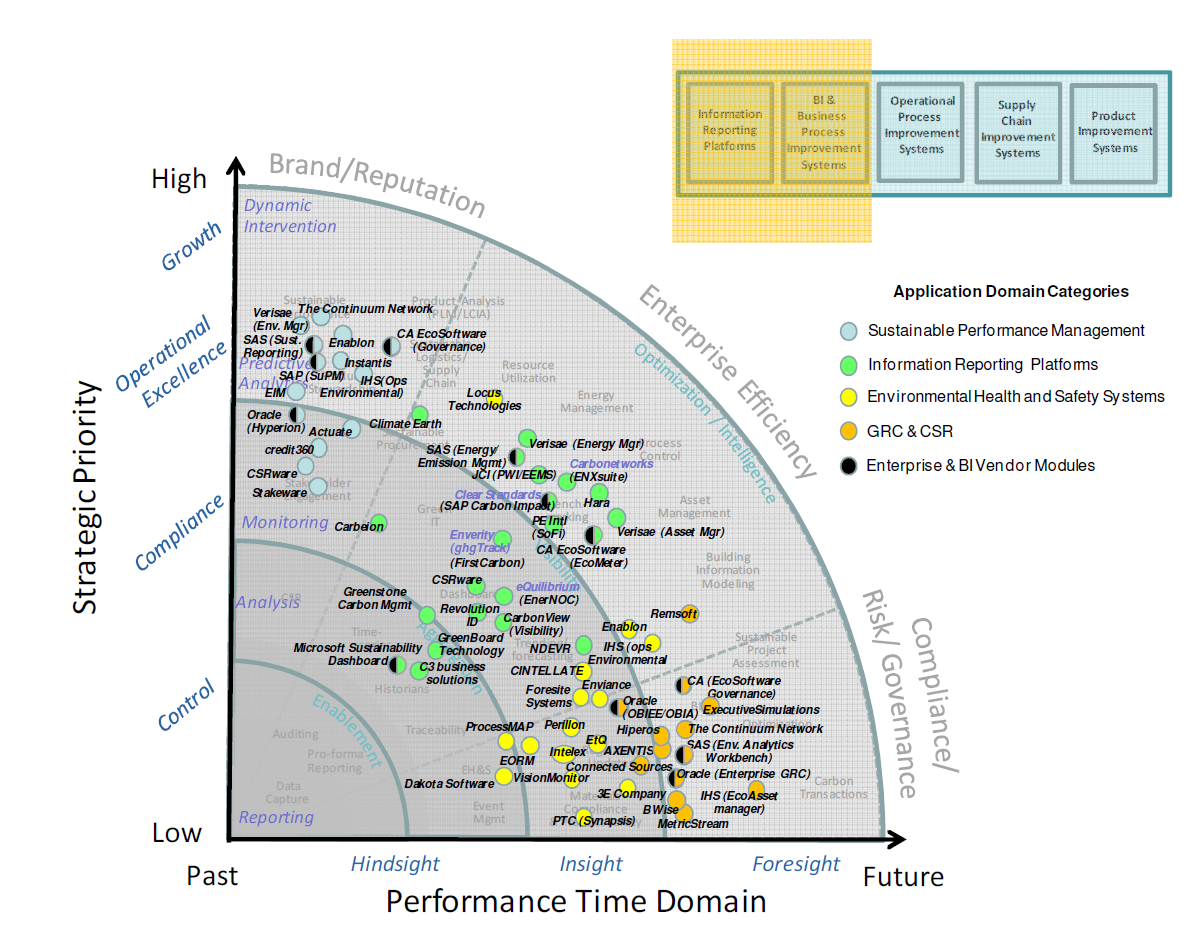
Gartner recognized the power of the Locus Platform in their early research.
This is the third post highlighting the evolution of Locus Technologies over the past 25 years. The first two can be found here and here. This series continues with Locus at 25 Years: How did we fund Locus?
Sorry, no posts matched your criteria
299 Fairchild Drive
Mountain View, CA 94043
P: +1 (650) 960-1640
F: +1 (415) 360-5889
Locus Technologies provides cloud-based environmental software and mobile solutions for EHS, sustainability management, GHG reporting, water quality management, risk management, and analytical, geologic, and ecologic environmental data management.
